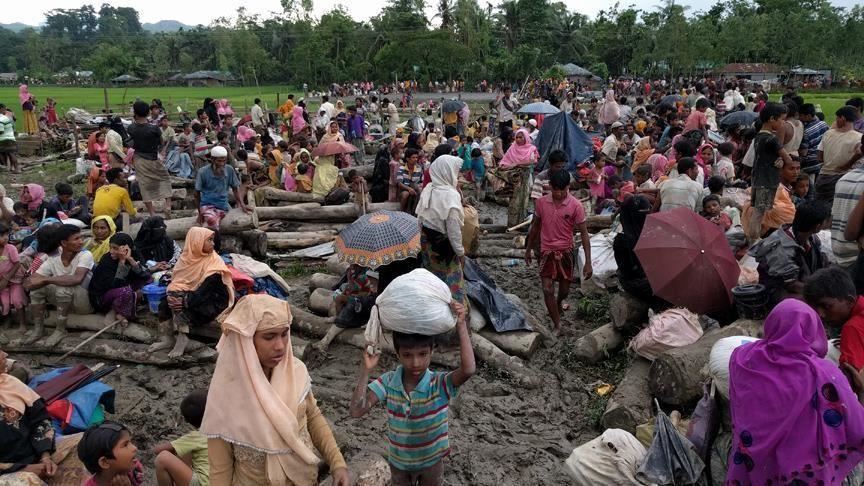
by Mohammad Kepayet 13 July 2020
Next August will be the third anniversary of the Rohingya genocide and the forcible exile. Bangladesh has given shelter to Rohingyas who fled Myanmar in 2017. Asia never saw that amount of refuge at the same time after the liberation war of Bangladesh. Rohingya repatriation has been discussed at various times. Some discussions are in process. But suddenly the coronavirus invades the repatriation debate. So the Rohingya repatriation process is coming to a halt. From the world media to the UN and all the powerful countries are now busy dealing with the Covid-19 pandemic.
Bangladesh and Myanmar signed an agreement in November 2017 to start Rohingya repatriation. The Joint Working Group (JWG) was formed at the Foreign Secretary-level in February 2018 to begin the repatriation. The fourth and final meeting of the JWG was held in Naypyidaw in May last year. Bangladesh wanted to hold the fifth meeting of the JWG in February this year.
Later, at the request of Myanmar, it was decided to do two months back in May. But the meeting did not take place due to the Covid-19 catastrophe. In such a situation, the dialog of Rohingya repatriation has practically stopped. Myanmar will hold general elections in forthcoming November. There are no indications that the Naypyidaw will be interested in discussing Rohingya repatriation before the general election.
In a general view, the refugee problem could be solved in three ways. First of all, if homeland situation would improve, they could return to their native land, just as the people of Bangladesh who took refuge in India amid the war of liberation, but they returned to the country after the war. Secondly, to rehabilitate the refugees in a third country. In recent times, this has happened in the case of large numbers of refugees fleeing war-torn Syria to Turkey and Greece. Germany and some European countries were receiving them. Thirdly, the assimilation of refugees to the host communities. But there is no example of such assimilation of such a large number of refugee groups in recent times. Apart from that, the idea of permanent settlement of such a large population in one of the most densely populated countries in the world is unrealistic and unreasonable. Unfortunately, some are trying to propagate this dangerous idea as a possible alternative. So Bangladesh needs to be aware of and vigilant in this regard.
Over the past few decades, a new symptom has emerged in some countries in Asia is the rise of radical Buddhist nationalism and the political empowerment of the Buddhist priest class. This illness is more widespread in Sri Lanka, Myanmar and Thailand. Buddhist priest class is the most key and loyal ally of the Myanmar army in the Rohingya genocide. Not only have these priests supported this atrocity, but they have also played an effective role in spreading hatred against the Rohingya and inciting them to be exiled. Unfortunately, they get direct or indirect support from China, Japan, India and Russia side. This support has put the state of Myanmar in an advantageous position. So in the case of the Rohingya issue, most of the western countries are not interested to pressurize to Myanmar for distancing with China, India and Russia.
According to the Myanmar government, the country’s total exports have increased by 56 percent since the Rakhine atrocities in 2017. The major destination of their exporting products is the European countries. The country is getting a Generalized System of Preferences (GSP) in the European Union market. However, after the Rakhine violence, the EU blacklisted some Burmese senior military officials.
In this situation recently India has said, repatriation of Rohingyas in a quick, safe and sustainable manner will be beneficial for all. Indian External Affairs Minister Dr. Subrahmanyam Jaishankar conveyed to his Bangladesh counterpart Dr. AK Abdul Momen that his country feels the necessity of quick repatriation of Rohingyas to Myanmar.
On the other hand, the Myanmar Union Election Commission announced that national elections are scheduled for November 8. Fortify Rights said, ahead of the upcoming elections, the Government of Myanmar should ensure all voting-age Rohingya—including refugees in Bangladesh—have the right to vote.
All those comments are bearing a positive sign in Rohingya repatriation. So Bangladesh should take some positive discussion with the concerned authority and with the concerned countries like India, China and Russia. If this repatriation process is not in talk, then it will take more time. And it will be not beneficial for all.
